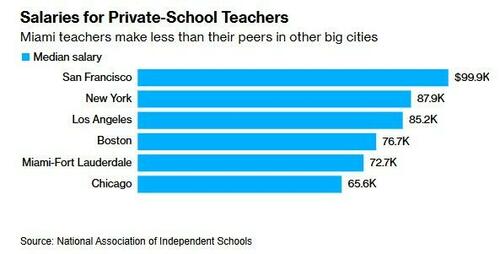Wealthy Private Schools In Upscale Miami Are Starting To Price Out Their Teachers
The rich neighborhoods in Miami are getting so rich, they’re starting to price out the teachers.
For example, Ransom Everglades, a top private school in Miami’s upscale Coconut Grove, serves the city’s wealthy families, including new Wall Street South transplants.
It boasts amenities like an Olympic pool, sailing, and a waterfront football field, it offers 24 varsity sports, 62 arts courses, and a cutting-edge science center. And with a 10-to-1 student-teacher ratio, admission is highly competitive—only one in seven sixth-grade applicants were accepted this year, according to parents.
But the school is struggling to retain teachers due to the increasing cost of living in the area. So much so that it has been building an endowment to help give teachers stipends to offset their living expenses, according to Bloomberg.
Ransom Everglades’ board, led by chair Miguel Dueñas, is creating a $30 million endowment to help its 132 teachers with living costs in Miami’s pricey market. They’ve raised $15 million so far from parents and alumni, aiming to provide each teacher at least $11,000 annually for housing expenses through the fund’s returns.
Dueñas commented: “The biggest issue that schools are facing right now in South Florida is the cost of living for teachers. So trying to solve that, or help it, is something that is strategic in nature for all schools.”
Bloomberg writes that Ransom Everglades faces a challenge in balancing competitive teacher pay with affordability for families, all despite charging $52,000 in annual tuition—less than elite New York schools like Dalton, which cost $65,000.
While offering perks like tuition discounts for teachers’ children and free meals, salaries are constrained by housing costs in Miami, where prices have surged 75% over five years.
Head of school Rachel Rodriguez emphasized that housing affordability is the biggest obstacle in recruiting top talent, as Miami ranks poorly for both affordability and income inequality.
Private school teachers nationwide earn about 25% less than their public-school counterparts, and Florida ranks second-to-last for public-school teacher pay.
Compounding this, Miami’s private-school teacher salaries trail cities like New York by 17%. Gulliver Prep, another Miami-area private school, is exploring higher tuition for wealthy families and donor-funded stipends to close the pay gap.
Without these adjustments, teachers like Jonathan Scholl, who left Ransom for a more affordable life in Denver despite lower pay, may continue to seek opportunities elsewhere, exacerbating a crisis for South Florida’s elite schools.
Tyler Durden
Wed, 11/20/2024 – 20:30

